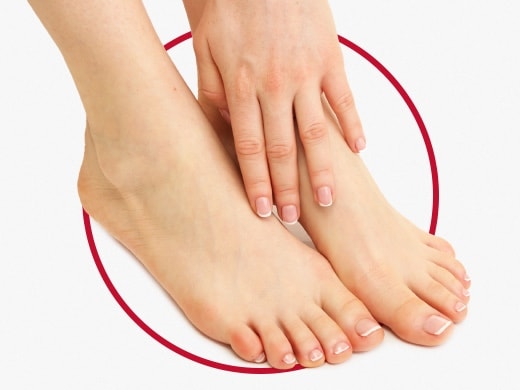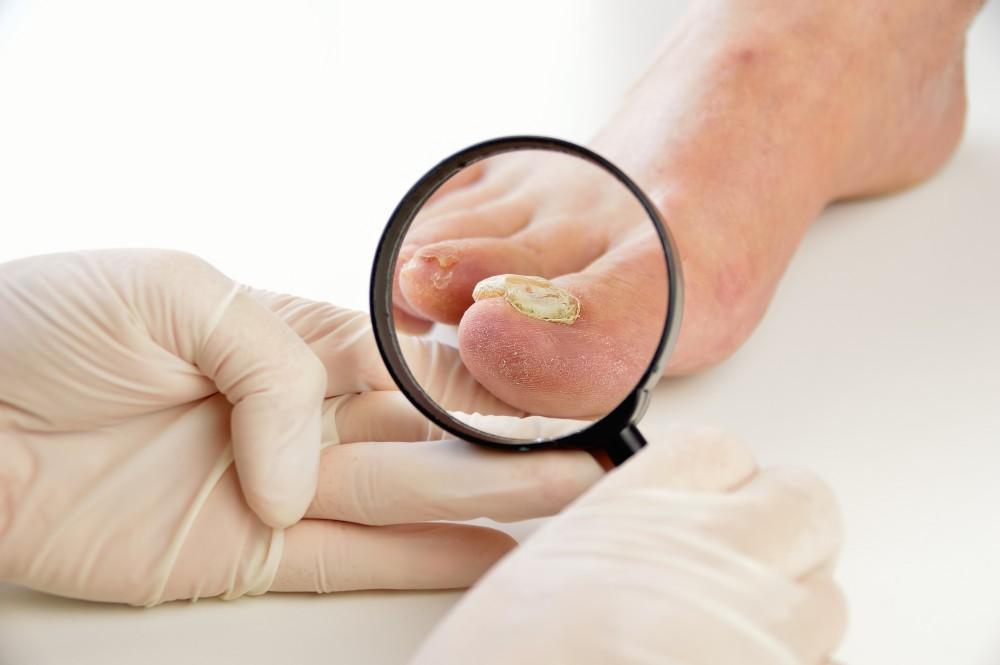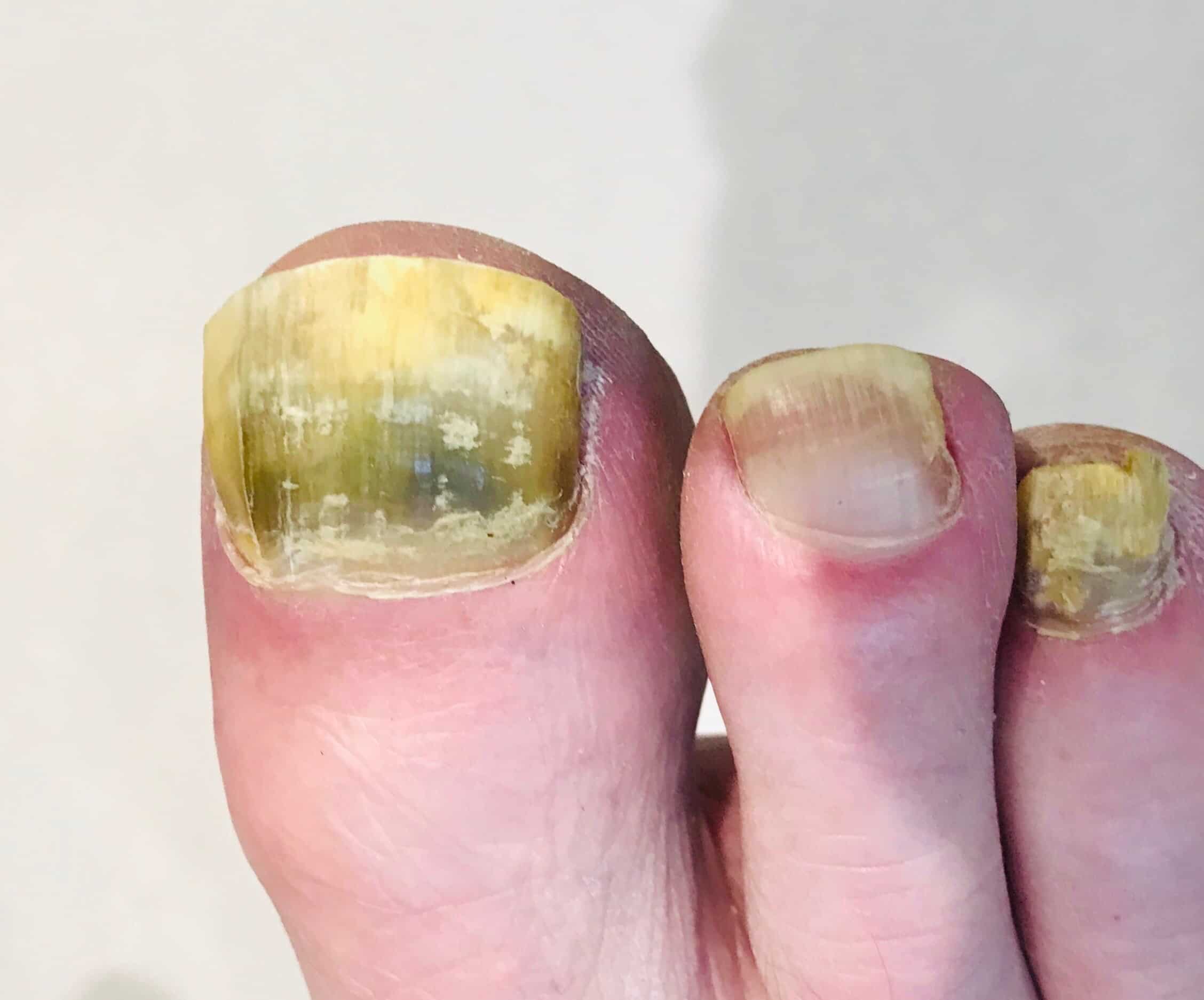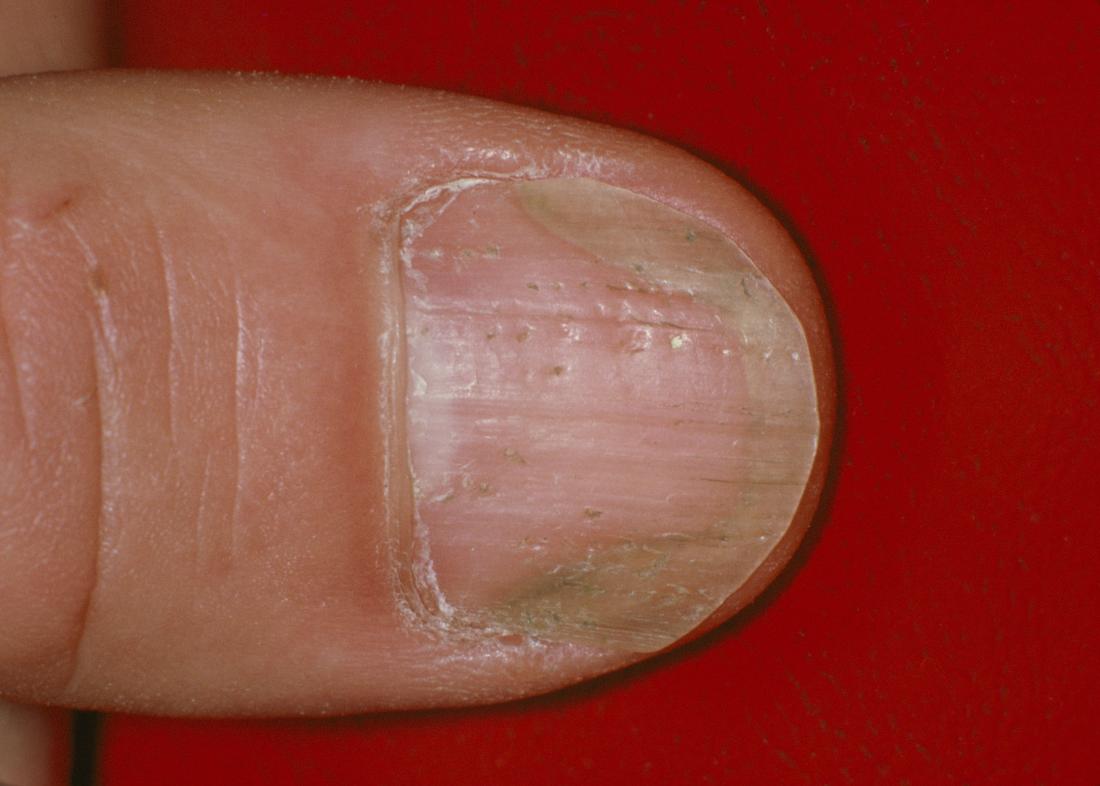What Is Nail Fungus?

Nail fungus, also known as onychomycosis, is a common fungal infection that affects the nails. It typically occurs when fungi enter the nail through a small cut or break in the skin. Once inside, the fungi multiply and cause the nail to become discolored, thickened, and brittle. Nail fungus can affect both the toenails and fingernails and is more common in adults than children. It is important to treat nail fungus promptly to prevent it from spreading to other nails or to other people.
A How Nail Fungus Is Caused
Nail fungus is caused by the invasion of fungi, specifically dermatophytes, into the nails. These fungi thrive in warm and moist environments, making the feet ideal breeding grounds for their growth. The fungi enter the nail through small cuts or breaks in the skin and then multiply, leading to the characteristic symptoms of nail fungus. Other factors that can contribute to the development of nail fungus include poor foot hygiene, wearing tight or non-breathable shoes, having a weakened immune system, and exposure to contaminated surfaces. It is important to take preventive measures and maintain good foot hygiene to minimize the risk of nail fungus.
B Common Symptoms Of Nail Fungus
Common symptoms of nail fungus include:
- Thickened nails: The affected nails may become thicker and harder than normal nails.
- Discoloration: Nails may develop a yellowish, brownish, or white discoloration.
- Brittle or crumbly nails: Infected nails can become brittle and easily break or crumble.
- Distorted shape: The shape of the infected nails may change, becoming irregular or misshapen.
- Foul odor: Nails affected by fungus can emit a strong, unpleasant odor.
- Pain or discomfort: In some cases, nail fungus can cause pain or discomfort, especially when walking or wearing shoes.
It is important to consult a healthcare professional for an accurate diagnosis and appropriate treatment if you suspect you have nail fungus.
Can Nail Fungus Spread?

Yes, nail fungus can spread from one person to another. The contagious nature of nail fungus means that it can be easily transmitted through direct contact with infected nails or by touching contaminated surfaces. Sharing personal belongings, such as nail clippers or towels, can also contribute to the spread of the fungus. Additionally, walking barefoot in communal areas, such as locker rooms or pool decks, can increase the risk of infection. It is important to practice proper hygiene and take preventive measures to avoid spreading or acquiring nail fungus.
A Understanding The Contagious Nature Of Nail Fungus
Nail fungus is highly contagious and can easily spread from person to person. The fungi that cause nail infections can be transmitted through direct contact with infected nails or by touching contaminated surfaces. Sharing personal items such as nail clippers, towels, or shoes can also contribute to the spread of the fungus. Additionally, walking barefoot in public areas like locker rooms or pool decks increases the risk of infection. It is important to understand the contagious nature of nail fungus and take necessary precautions to prevent its spread.
B Factors That Contribute To The Spread Of Nail Fungus
Certain factors can contribute to the spread of nail fungus. These include:
- Poor hygiene practices: Not keeping the feet clean and dry can create an ideal environment for fungi to thrive and spread.
- Weakened immune system: People with weakened immune systems are more susceptible to fungal infections, including nail fungus. This can be due to conditions such as diabetes, HIV/AIDS, or certain medications.
- Nail trauma: Injuries to the nails, such as cuts or cracks, can provide an entry point for fungi to infect the nail bed and spread.
- Sharing personal items: Sharing items like towels, nail clippers, or shoes with an infected individual increases the risk of spreading the fungus.
- Walking barefoot in public places: Walking barefoot in public areas like pool decks, locker rooms, or communal showers can result in exposure to fungi and potential infection.
It is important to be aware of these factors and take necessary precautions to prevent the spread of nail fungus.
Preventing The Spread Of Nail Fungus

Proper hygiene practices play a crucial role in preventing the spread of nail fungus. Here are some steps you can take to minimize the risk:
- Keep your feet clean and dry, especially between the toes.
- Trim your nails regularly and avoid cutting them too short or rounding the corners.
- Wear breathable shoes and socks that wick away moisture.
- Avoid sharing towels, nail clippers, or shoes with others.
- Use antifungal powders or sprays in your shoes and socks.
- Keep your feet protected in public spaces by wearing sandals or flip-flops.
- Treat any existing fungal infections promptly to prevent further spread.
By following these preventive measures, you can reduce the chances of spreading nail fungus to yourself or others.
A Proper Hygiene Practices
To prevent the spread of nail fungus, it is essential to maintain proper hygiene practices. Here are some key steps to follow:
- Keep your feet clean and dry, especially between the toes.
- Trim your nails regularly, avoiding cutting them too short or rounding the corners.
- Wear breathable shoes and moisture-wicking socks.
- Avoid sharing towels, nail clippers, or shoes with others.
- Use antifungal powders or sprays in your shoes and socks.
- Protect your feet in public spaces by wearing sandals or flip-flops.
- Promptly treat any existing fungal infections to prevent further spread.
By adhering to these hygiene practices, you can significantly reduce the chances of spreading nail fungus.
B Avoiding Shared Spaces And Items
To prevent the spread of nail fungus, it is important to avoid sharing personal items and spaces. Here are some key measures to take:
- Avoid sharing towels, socks, shoes, or nail clippers with others.
- Make sure to disinfect any shared surfaces, such as gym equipment or shower floors, before use.
- Use disposable foot covers or bring your own sandals when visiting public areas like swimming pools or locker rooms.
- Wash your hands thoroughly after coming into contact with infected nails or surfaces.
By avoiding shared spaces and items, you can significantly reduce the risk of contracting or spreading nail fungus.
Treatment Options For Nail Fungus

There are various treatment options available for nail fungus. Over-the-counter antifungal remedies, such as medicated nail polishes or creams, can be effective in treating mild cases of nail fungus. These products typically contain ingredients like miconazole or clotrimazole that help kill the fungus. For more severe cases, medical treatments may be necessary. This can include oral antifungal medications, which are prescribed by a healthcare professional. In some cases, surgical intervention may be required to remove the infected nail. It is important to consult with a healthcare provider to determine the best treatment option for your specific case of nail fungus.
A Over-the-counter Antifungal Remedies
Over-the-counter antifungal remedies are a common and easily accessible treatment option for nail fungus. These products, such as medicated nail polishes or creams, can be applied directly to the affected nails. They typically contain antifungal ingredients like miconazole or clotrimazole, which help kill the fungus and promote healthy nail growth. It is important to carefully follow the instructions provided with these products and continue using them for the recommended duration. Over-the-counter antifungal remedies can be effective in treating mild cases of nail fungus, but for more severe cases, medical treatments may be necessary.
B Medical Treatments For Severe Nail Fungus
Medical treatments for severe nail fungus may be necessary when over-the-counter remedies are not effective. These treatments are typically prescribed by a healthcare professional, such as a dermatologist or podiatrist. Some common medical treatments for severe nail fungus include:
- Oral antifungal medications: These medications are taken orally and work systemically to eliminate the fungus. They may need to be taken for several months to ensure complete eradication.
- Prescription-strength topical treatments: These are stronger than over-the-counter options and may include antifungal creams, ointments, or solutions. They are typically applied directly to the affected nails.
- Nail removal: In severe cases, the infected nail may need to be surgically removed. This allows for direct treatment of the underlying infection.
It is important to consult with a healthcare professional to determine the most appropriate medical treatment for severe nail fungus.
Dealing With Nail Fungus In Public Settings

When dealing with nail fungus in public settings, it is important to be aware of the risk of contagion. Nail fungus can easily spread in shared spaces such as public locker rooms and showers. To prevent the spread of nail fungus, it is recommended to practice good hygiene by keeping nails clean and dry, avoiding walking barefoot in public areas, and wearing protective footwear in communal places. Additionally, it is important to disinfect personal items and avoid sharing them with others. By taking these precautions, you can reduce the risk of spreading nail fungus in public settings.
A Understanding The Risk Of Contagion In Public Spaces
In public spaces, the risk of spreading nail fungus is higher due to the close proximity of individuals and shared surfaces. Public places such as swimming pools, locker rooms, and gym showers are hotspots for fungal infections. Fungi thrive in damp and warm environments, making these spaces ideal breeding grounds. Additionally, walking barefoot increases the chances of coming into direct contact with the fungus. People with compromised immune systems or diabetes are especially vulnerable. It is essential to be cautious and take preventive measures when using these public facilities to minimize the risk of contagion.
B Steps To Prevent The Spread Of Nail Fungus In Public
To prevent the spread of nail fungus in public spaces, there are several steps you can take:
- Wear protective footwear: In areas such as public showers, locker rooms, and pools, always wear flip-flops or water shoes to minimize direct contact with the fungus.
- Keep feet clean and dry: After being in a public space, thoroughly wash and dry your feet, paying special attention to the spaces between your toes. Moisture can create an ideal environment for fungal growth.
- Avoid sharing personal items: Refrain from sharing items such as towels, socks, shoes, or nail clippers with others to reduce the risk of spreading the infection.
- Use antifungal powders or sprays: Applying antifungal powder or spray to your feet before entering public spaces can help prevent the growth and spread of nail fungus.
By following these preventive measures, you can significantly reduce the risk of contracting and spreading nail fungus in public settings.
Conclusion

In conclusion, nail fungus is a common infection that can spread easily if proper precautions are not taken. Understanding the contagious nature of nail fungus and the factors that contribute to its spread is crucial in preventing its transmission. By practicing good hygiene, avoiding shared spaces and items, and seeking appropriate treatment, individuals can limit the spread of nail fungus. It is important to remain vigilant and take proactive measures to protect oneself and others from this contagious infection. With proper prevention methods, the risk of nail fungus spreading in public settings can be significantly reduced.
Comparison Of Prevention Methods
Various methods can be employed to prevent the spread of nail fungus. It is crucial to compare and understand these methods to determine the most effective approach. While proper hygiene practices, such as keeping nails clean and dry, are essential, the use of antifungal products can provide an extra layer of protection. Over-the-counter remedies offer convenience and accessibility, although medical treatments prescribed by a healthcare professional may be necessary for severe cases. Additionally, avoiding shared spaces and items, such as shoes and towels, significantly reduces the risk of contamination. By evaluating these prevention methods, individuals can make informed decisions to safeguard themselves and others from nail fungus.
Answering Frequently Asked Questions
In this section, we will address some frequently asked questions about nail fungus and its contagious nature:
- Can toenail fungus spread to other parts of the body?
- Yes, toenail fungus can spread to other areas of the body if proper precautions are not taken. It is important to practice good hygiene and avoid touching or scratching infected nails.
- Is it safe to share shoes or socks with someone who has nail fungus?
- No, sharing shoes or socks with someone who has nail fungus is not recommended. It increases the risk of spreading the infection to others.
- Can nail fungus be cured completely?
- With proper treatment and consistent care, nail fungus can be effectively treated and eliminated. However, it may take time and patience to fully cure the infection.
- Are antifungal creams or ointments effective in treating nail fungus?
- Over-the-counter antifungal creams or ointments can be effective in treating mild cases of nail fungus. However, for severe infections, it is best to consult a healthcare professional for stronger prescription medications.
By addressing these frequently asked questions, individuals can gain a better understanding of nail fungus and how to prevent its spread.
FAQ: Can Nail Fungus Spread?
Q1: Can nail fungus spread from one nail to another?
A: Yes, nail fungus can indeed spread from one nail to another. If left untreated, the fungal infection can easily pass from an infected nail to healthy nails. This usually occurs when the same tools, such as clippers or files, are used on both infected and healthy nails without proper disinfection.
Q2: Can nail fungus spread to other people?
A: Nail fungus is contagious and can spread to other individuals. The infection can be transmitted through direct contact with an infected person’s nails or by sharing items like socks, shoes, or towels. It is advisable to maintain good hygiene and avoid sharing personal items to prevent the spread of nail fungus.
Q3: How does nail fungus spread in public places?
A: Nail fungus can spread in public places like swimming pools, locker rooms, or showers where people often walk barefoot. Fungal spores thrive in warm and moist environments, making these areas particularly susceptible to contamination. Direct contact with contaminated surfaces can lead to an infection.
Q4: Can nail fungus spread from toenails to fingernails?
A: While it is less common, nail fungus can spread from toenails to fingernails. This can occur when the same fingers that touch or scratch infected toenails come into contact with the healthier fingernails. Proper hand hygiene and avoiding contact with infected nails can help prevent the spread from toenails to fingernails.
Q5: Can nail fungus spread to other parts of the body?
A: In some cases, nail fungus can spread to other areas of the body. The fungus can easily transfer from the infected nails to the skin, causing an infection called dermatophytosis. This may result in additional fungal infections on other body parts, such as the hands, groin, or even the scalp.
Q6: Can nail fungus spread through nail salons?
A: Nail salons can be potential sources of nail fungus transmission if proper sanitation protocols are not followed. Contaminated tools, unsanitized footbaths, or insufficient sterilization practices can contribute to the spread of nail fungus among clients. It is crucial to choose a reputable salon that maintains high standards of cleanliness and disinfection.
Q7: How to prevent the spread of nail fungus?
A: To prevent the spread of nail fungus, it is important to follow these measures:
- Maintain good foot and hand hygiene by keeping nails clean and dry.
- Avoid sharing personal items like towels, nail clippers, and shoes.
- Wear breathable shoes and socks made of natural materials.
- Use antifungal sprays or powders in shoes and socks.
- Regularly disinfect nail tools and consider bringing your own when visiting a salon.
- Avoid walking barefoot in public places, especially in moist areas like locker rooms or poolside.
Remember, it’s essential to consult a healthcare professional for an accurate diagnosis and appropriate treatment for nail fungus.

I am proud to offer non-toxic beauty options. The gel polishes I offer are “9-Free”, free of nine of the most commonly found allergens and toxic chemicals in nail polish, and cruelty-free, vegan, and HEMA-free. The nail lacquers I offer range between “7-Free” and “16+-Free” and are also cruelty-free and vegan.